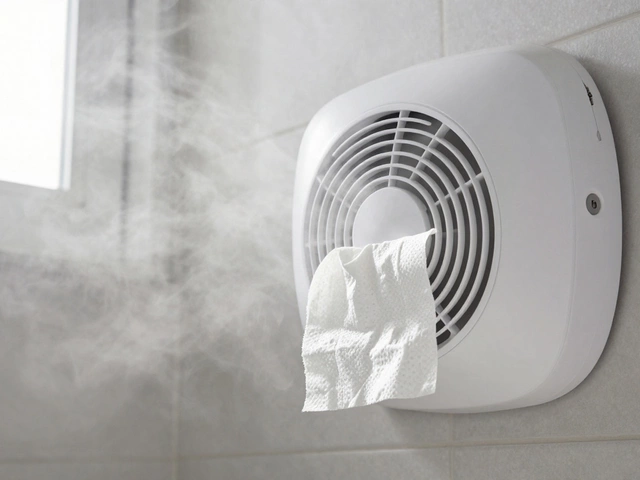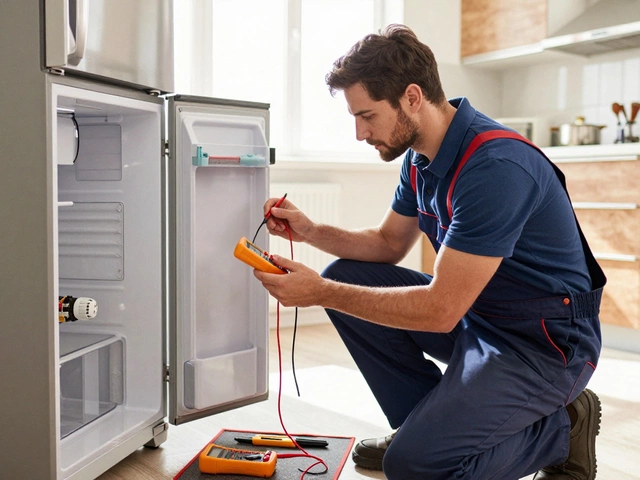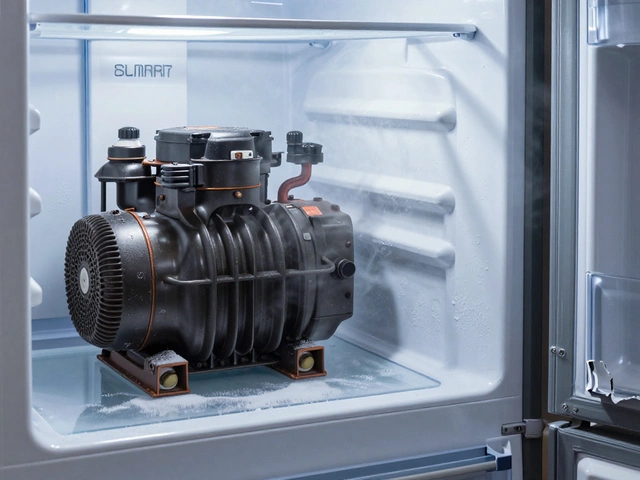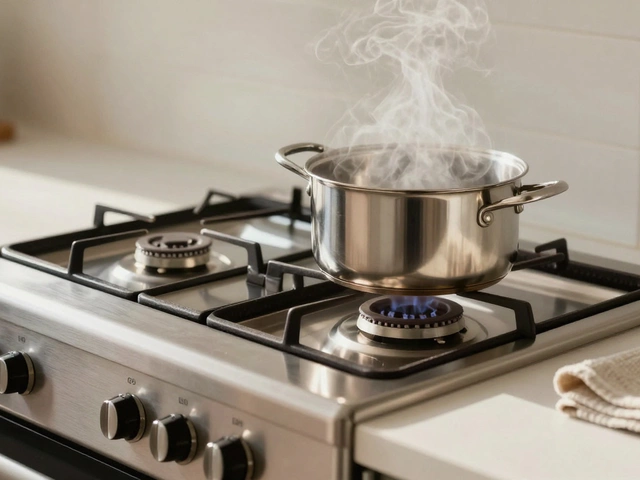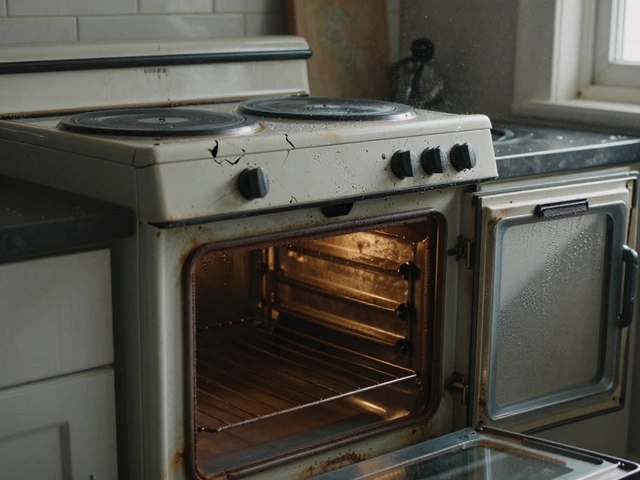When your refrigerator starts making strange noises or isn't cooling as it should, you might find yourself at a crossroads: Do you repair it or replace it? This is a common dilemma many homeowners face. Both options come with their own sets of pros and cons, and the right choice often depends on various factors including the fridge's age, the extent of damage, and your household budget.
Before making a decision, it's important to consider a few key details. Understanding the typical lifespan of your fridge and how its age affects performance can guide you. Repairing an older model might seem cheaper at first, but frequent fixes can add up and might not just justify the investment.
Let's explore some practical tips to guide you through this decision-making process, ensuring you end up with a solution that's both cost-effective and efficient. From evaluating energy costs to understanding repair pricing, I'll help you navigate the ins and outs of this common household question.
- Evaluating the Age and Condition of Your Refrigerator
- Understanding Repair Costs vs. Replacement Costs
- Energy Efficiency and Operating Costs
- Signs Your Fridge Might Need Replacing
- Environmental Impact: Repair or Replace?
- Top Tips for Making the Best Decision
Evaluating the Age and Condition of Your Refrigerator
One of the first steps in deciding whether to repair or replace your refrigerator is assessing its age and current condition. Most refrigerators are built to last about 10 to 20 years. If yours is approaching or has surpassed this range, it might be time to consider a replacement. However, this doesn't mean that a young refrigerator is always worth repairing. The importance of the appliance's age lies in understanding the depreciation in performance and efficiency over time, which can directly affect your electricity bills and daily convenience.
Consider this: a 15-year-old unit will likely encounter more frequent issues and could be less energy-efficient compared to newer models on the market. Energy consumption in aging models often increases as the mechanical parts wear down and become less effective. Even if they seem small, these inefficiencies can lead to significantly higher electricity bills over time. Furthermore, older refrigerators can often suffer from parts that are either difficult to find or expensive to replace, adding another layer of complexity to your decision-making.
When you evaluate the condition of your fridge, look beyond its physical appearance. Listen for irregular noises, check for consistent temperature control, and inspect seals for any signs of wear or damage. These aspects can indicate that your fridge is working harder than it should, which in turn reduces its lifespan and effectiveness. It's also worth comparing the repair cost estimate with the purchase price of a new unit. If repairs exceed half the cost of a new fridge, investing in a new one may end up being a more cost-effective decision.
According to Energy Star, "Replacing an old refrigerator with a new, Energy Star certified one can save you over $200 on your energy bill over the next five years."
This statistic highlights the potential savings from investing in a more efficient model. Additionally, some newer models come with enhanced features like smart technology that can further optimize your household's energy usage. Such benefits can offset the initial outlay over time, making them a worthy investment if your old unit is on its last legs.
To summarize, assessing the age and condition of your fridge is crucial in making an informed decision. While it might seem economical to repair an old appliance, you must weigh these costs against the potential savings and benefits of a new, more efficient model. Consider consulting with a professional technician to gain insight into the expected longevity of your current appliance based on its condition and performance.
Understanding Repair Costs vs. Replacement Costs
When facing an appliance dilemma, like figuring out whether to repair or replace a malfunctioning refrigerator, it's vital to grasp the financial implications of both choices. Repair costs can vary widely depending on the issue at hand, parts needed, and even your location. For instance, if your fridge only needs a minor fix, like replacing a thermostat or a gasket, you might only spend a modest amount compared to buying a brand-new appliance. However, when dealing with significant issues such as compressor or coolant leaks, the repair bills can climb to the territory where purchasing a new fridge might seem more viable.
Replacing a refrigerator, on the other hand, involves more than just the upfront cost of the appliance itself. Delivery fees, removal costs for the old unit, and potentially even alterations to your kitchen furnishings to accommodate a new model can add unexpected expenses. Moreover, new refrigerators often offer enhanced energy efficiency, potentially leading to long-term savings which may overshadow the initial cost spike. Did you know? According to the U.S. Department of Energy, a fridge from the 1990s could be using double the energy of today's Energy Star models, making replacements quite enticing from a savings standpoint.
To make a wise decision, consider obtaining estimates from qualified repair technicians. A professional diagnosis can shed light on the precise nature of the problem and the anticipated costs, preventing surprises down the road. Additionally, calculating the remaining life expectancy of your appliance is another crucial factor. For a fridge approaching the end of a typical 10-15-year lifespan, investing in a new unit could save you from repeated repairs and service disruptions. Here's a helpful tip: If the repair expenses exceed 50% of the replacement cost, purchasing a new refrigerator is typically recommended.
"The cost of unexpected refrigerator repairs can add up quickly, particularly if it's an older model," advises Jane Simmons from the Home Appliance Institute. "Planning ahead and evaluating options can be key to managing household budgets effectively."
When evaluating repair versus replacement, it’s important to look beyond immediate expenses and factor in potential utility savings. Newer models not only consume less power but often boast better technology for food preservation. Enhanced features, like smart connectivity and heightened cooling precision, might offer added value to households. If you're environmentally conscious, consider that keeping an older, less efficient fridge running might have a larger carbon footprint compared to switching to a more eco-friendly model. Such considerations can weigh in heavily depending on your personal values and lifestyle preferences.
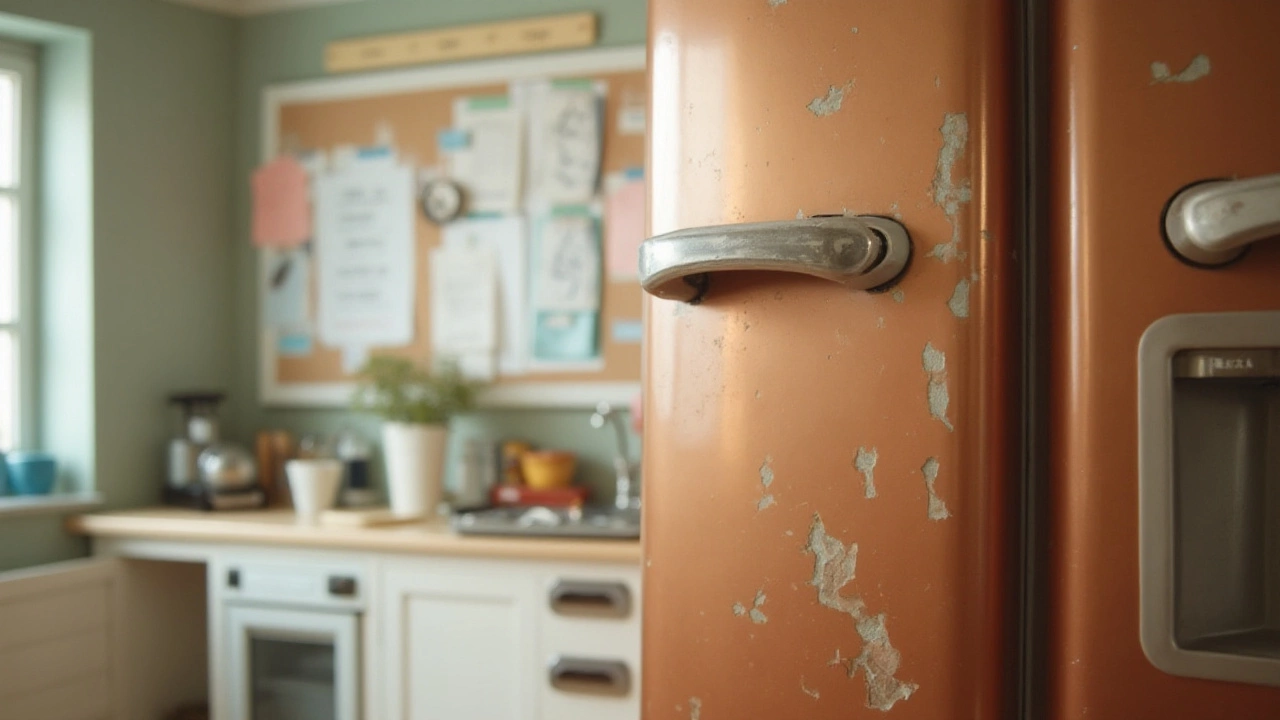
Energy Efficiency and Operating Costs
When it comes to making a choice between fridge repair and replacement, energy efficiency plays a crucial role that often gets overlooked. A refrigerator is one of the largest energy consumers in most households, running around the clock to keep food fresh. Older models are typically less efficient, consuming significantly more electricity than their modern counterparts. The U.S. Department of Energy notes that refrigerators manufactured before the year 2000 can use up to three times more energy than today’s energy-efficient models. This discrepancy can greatly inflate your utility bills over time.
Investing in a new, energy-efficient refrigerator may seem costly upfront but can lead to substantial savings over the lifespan of the appliance. Energy Star-rated refrigerators are designed to minimize operating costs by using sophisticated cooling technologies that require less electricity. These models not only ease your wallet but also have a reduced environmental impact. In fact, upgrading to an Energy Star-rated fridge can save a household over $200 in energy costs over five years, according to the Environmental Protection Agency (EPA).
"The efficiency of household appliances significantly impacts both your financial outlay and environmental footprint," says Lisa Field, an energy analyst at Green Matters.
Understanding the importance of energy consumption becomes especially vital if you have an older fridge. The cost of repairing an aging, inefficient refrigerator might seem lower than buying a new one, but you need to factor in the ongoing operational costs. If your repairs can enhance energy efficiency, like replacing worn-out door seals or cleaning condenser coils, they might be worthwhile. However, if the repairs do not address the efficiency issue, replacement is often the more economical path over the long term.
Consider conducting an energy audit in your home to evaluate how much electricity your current appliance uses compared to new models on the market. Tools like a Kill A Watt electricity usage monitor can help you determine the exact energy consumption of your fridge. These insights might surprise you and clarify whether sticking with an older, less efficient model is just burning through your money. Plus, many utility companies offer rebates for upgrading to energy-efficient models, which can help offset initial costs.
In conclusion, evaluating the energy efficiency and operating costs is not just about the potential savings on your energy bills; it's also about making an informed decision that benefits both you and the environment. Whether to repair or replace your refrigerator, remember to weigh these considerations carefully for optimal results.
Signs Your Fridge Might Need Replacing
The refrigerator, that stalwart of the kitchen, can often tell us when it is time to part ways if we know what to look for. Like any other appliance in your home, a refrigerator has a typical lifespan—usually around 10 to 20 years depending on the brand and model. So, when does repair evolve from a quick fix to a futile endeavor? One major sign is frequent breakdowns. If your fridge repair costs are adding up to a significant portion of the price of a new refrigerator, it may be wise to consider replacement. This is particularly true if components like the compressor or motherboard are failing, as these parts are costly to replace and essential to the operation of the appliance.
Another warning bell comes when the fridge struggles to maintain a consistent temperature. If you find that food is spoiling faster than it should or that items in your refrigerator freeze for no apparent reason, there could be a failing thermostat or worn-out door gasket. These issues not only lead to unnecessarily high energy bills but also signal deeper problems that often warrant replacement. According to the U.S. Department of Energy, refrigerators over 15 years old can consume energy inefficiently, sometimes costing you an extra $100 per year compared to newer models.
Odd noises are another dead giveaway. While a refrigerator isn't truly silent, consistent loud humming, clicking, or buzzing may suggest that the motor or compressor is working overtime—a telltale sign that the end might be nigh. And there's the case of excess condensation or frost buildup. This might mean damaged seals or failing components, leading to lower efficiency and higher utility costs. Michael Goldstein, a home appliance expert, once noted, "Your refrigerator should operate quietly and efficiently. Excess condensation and noise indicate it's fighting a losing battle, much like a car stuck in first gear."
Lastly, consider looking at the door seals. If they seem flaky, brittle, or don't shut tightly, they can allow warm air in, causing the fridge to use more energy to cool down. Replacing these can be costly and, sometimes, more trouble than they are worth. In light of these points, the decision to repair or replace a refrigerator becomes clearer when we observe the appliance's behavior and reflect on its function in our daily lives. With energy costs and environmental considerations at play, opting for a new refrigerator replacement can often be the best choice for both your wallet and peace of mind.

Environmental Impact: Repair or Replace?
When it comes to considering the environmental impact of deciding whether to repair or replace a refrigerator, the stakes can feel quite high. Our planet's health is intertwined with the daily choices we make, and deciding on fridge repair versus replacement is no small thing. Modern convenience often brings with it significant environmental costs, which we sometimes overlook in favor of immediate practicality. One might think that keeping an existing appliance is always greener, but sometimes upgrading to a more efficient model can be the more sustainable choice.
Refrigerators, especially older models, can be large energy consumers, accounting for as much as 14% of a home’s energy use, according to the U.S. Department of Energy. Modern Energy Star-rated fridges consume up to 40% less energy than conventional models sold just ten years ago. Thus, replacing an energy-draining unit with a newer, more efficient model could result in significant energy savings, translating into reduced carbon footprints over time. Yet, manufacturing a new appliance also demands a hefty environmental toll, from the extraction of raw materials to the emissions involved in fabrication and transportation.
The repair of a fridge, while often extending the life of an appliance and reducing waste in landfills, involves labor and sometimes the transportation of parts. Some repairs might involve components that are detrimental to the environment. For example, older refrigerators contain refrigerants like CFCs (chlorofluorocarbons) which are harmful to the ozone layer, and their removal or leakage during servicing can pose risks. A thoughtful consideration involving the repair process would entail whether the parts used are sustainable or if the procedure aligns with eco-friendly practices.
"There are no environmental silver bullets in choosing between repair and replacement," says Dr. Lily Jacobs, an expert in sustainable consumer practices. "Each decision should be made on a case-by-case basis, weighing the lifecycle impact of the appliance."
Interestingly, studies indicate that extending the life of an appliance like a refrigerator intersects validly with reduced environmental footprint, thanks in part to less waste ending up in landfills. EPA data indicates only 5.6% of refrigerators actually get recycled, so extending the life of the current one can be less wasteful under the right circumstances. But there's a flip side: older refrigerators that use ozone-depleting substances should not escape scrupulous attention regarding their disposal.
For those aiming to make a greener decision while contemplating fridge repair or replacement, weighing the age and condition of your current appliance against the eco-friendly benefits of a new energy-efficient refrigerator is key. Ideally, this decision would be complemented by research into local recycling programs that responsibly manage old units and also by calculating potential energy savings to motivate every kilowatt-hour conserved over years to come.
Top Tips for Making the Best Decision
Choosing between repairing or replacing your refrigerator is not always straightforward, but a thoughtful approach can make this tough decision a bit easier. First, consider the age of your appliance. On average, a standard refrigerator can last from 10 to 20 years. If yours is approaching or has surpassed the decade mark, it might be wise to lean towards replacement, as frequent repair needs can be a sign of retirement.
Repairs can be cost-effective, particularly if your fridge is within the early to mid-stage of its lifespan and the problem is minor—like a faulty thermostat or a malfunctioning ice maker. Fridge repair costs typically range from $100 to $400. However, some parts like compressors are expensive, and if the repair estimates start to rival the cost of a new fridge, it's time to reconsider your options. The 50% rule is a handy guideline; if the repair costs amount to 50% or more of the replacement cost, a new fridge might be a smarter investment.
Energy efficiency is another critical factor. New models are often far more energy-efficient than old ones, potentially saving you money on utility bills and lessening your environmental footprint. The latest models can save up to 40% in energy compared to those made a decade ago. The Energy Star label is an excellent benchmark for gauging energy savings. Energy-efficient models, while initially more expensive, can lead to significant utility bill reductions over time.
As the U.S. Environmental Protection Agency notes, "Replacing your old refrigerator with a new Energy Star-qualified model can save over $270 in energy costs over five years."
Understanding the condition of the fridge helps significantly. If you notice persistent issues like strange noises, poor cooling performance, or leaks, it might hint at deeper, systemic issues that temporary fixes won't resolve. Regular maintenance can prolong an appliance’s life, but pervasive problems often recur. Use the opportunity to upgrade to modern technologies such as smart fridges that offer connectivity features.
Consider the environmental impact as well. Disposing of an old refrigerator improperly can lead to environmental hazards due to refrigerants and oils. Many manufacturers or retailers offer recycling programs or can guide you to eco-friendly disposal options. Making a decision that aligns with larger environmental consciousness can be rewarding, knowing you have lessened your environmental footprint.
Lastly, consult with a trusted appliance repair specialist or explore customer reviews and professional assessments. Opinions from those who frequently handle refrigerator replacement scenarios can provide valuable insights. Plus, tapping into community forums or articles can offer personal anecdotes that can help illuminate pros and cons you might not have initially considered.

